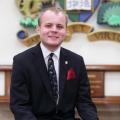
The lawyer defending a Major General accused of fraudulently claiming allowances for his children to attend boarding school has said that his roles in Andover and London made it more difficult to comply with the “mess” of military rules.
Major General Nick Welch is on trial at Bulford Military Court accused of one charge of falsely claiming £48,000 to pay for his children’s boarding schools between December 2015 and February 2017. He has denied the charge.
The claimed payment, for the Continuity of Education Allowance (CEA), is aimed at allowing children of service personnel to remain at the same schools to enable their serving parent to be accompanied by their spouse as they are posted to different locations.
Sarah Jones QC, defending Welch, said the allegations had been “painted as a national scandal” and challenged the prosecution to say “what lies, if any" he had told.
In response, Sarah Clarke QC said he had been “dishonest” and continued to claim the CEA as he “didn’t want to curtail his family’s lifestyle”.
The charges refer to the Major General’s claim of the CEA for his children to attend at the £37,000-a-year Clayesmore School and the £22,500-a-year Hanford School between 2015 and 2017.
The prosecution states that the 57-year-old had applied for the allowance on the basis that both he and his wife would not be living close to the children’s schools in Dorset.
Prosecutors claim that Welch’s wife, Charlotte, actually spent most of her time at a cottage in Blandford Forum, Dorset, close to the two schools rather than at their stated home in London.
Sarah Jones QC, defending, said that Welch could only be convicted if the prosecution proved he had dishonestly breached the rules of the CEA which she said were a “mess”.
She said: “Can they make you sure there is a single consistently-applied set of rules that are clearly set out and can be easily understood or will the evidence show that the methods are a mess, that so-called experts in this field may disagree fundamentally at what should be counted and what should be discounted.”
Ms Jones said that Welch’s mobile role in the Army with responsibilities at the MoD in London and Army headquarters in Andover made it more difficult to establish his compliance with the CEA regulations.
She told the panel judging the case: “Does General Nick Welch’s position make it especially difficult to apply or understand the rules as they might apply to him, not that he is somehow elevated by reason of his rank which could see him abuse the rules, as the prosecution seem to want to make it appear.
“If it’s not clear for him, is it clear where his wife should be if the point is that she should be accompanying him for accompanied service.”
Ms Jones added: “Have the prosecution proved that someone who served the Army as long and as well as he did, who was a leader of men and women, that this man acted dishonestly?
“That he sought to deceive, that he asked his wife to deceive, that he embroiled his children in what has been painted as a national scandal?
“Did he pretend to be somewhere he wasn’t, did he pretend not to be somewhere he was? Did he hide anything, what lies, if any, did he tell?”
Ms Jones questioned the prosecution claim that a change in the defendant’s behaviour following the launch of the investigation was a proof of his guilt.
She continued: “Might it be more worrying if there hadn’t been a change. You may feel a failure to change may have been a sign of entitlement and arrogance, that the rules do not apply to him.”
Describing the prosecution as “invidious”, Ms Jones added: “Was this man serving accompanied in the ordinary meaning of these words, did he and his wife seek to be together whenever they could, whenever the demands of his service allowed?
“Did Charlotte order every single aspect of his family life so that he could serve the Army as best as he could, did she support him so the Army could have the best of him? And if she did, should that be punished?”
Sarah Clarke QC, prosecuting, said that Welch had a ‘legal duty’ to inform the MoD of any change of his family’s living arrangements which would mean he was no longer entitled to CEA.
She said: “He didn’t do it because he wanted to continue to claim CEA and didn’t want to curtail his family’s lifestyle in order to do so and that is dishonest.”
Ms Clarke said that following the launch of the investigation into his CEA claim, Welch stated that he believed his wife had been within the 90-day rule which states that the spouse should not be away from the registered home for more than 90 days per year.
The trial continues.



Comments: Our rules
We want our comments to be a lively and valuable part of our community - a place where readers can debate and engage with the most important local issues. The ability to comment on our stories is a privilege, not a right, however, and that privilege may be withdrawn if it is abused or misused.
Please report any comments that break our rules.
Read the rules here